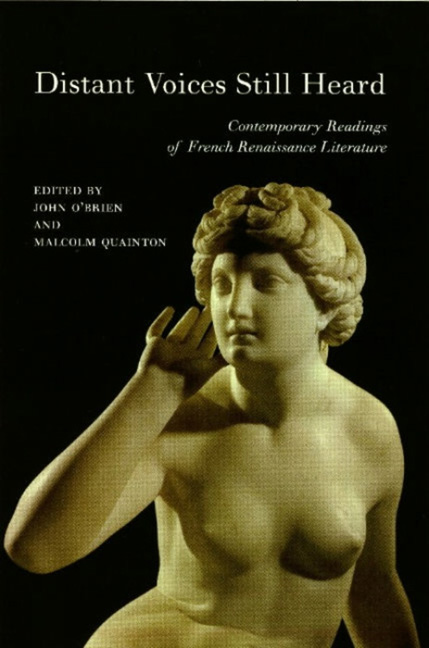Book contents
- Frontmatter
- Contents
- Editors’ Foreword
- Introduction: The Time of Theory
- 1 The Highs and Lows of Structuralist Reading: Rabelais, Pantagruel, chapters 10—13
- 2 Rabelais’ Strength and the Pitfalls of Methodology: Tiers Livre, chapters 7–18
- 3 ‘Blond chef, grande conqueste’: Feminist Theories of the Gaze, the blason anatomique and Louise Labé's Sonnet 6
- 4 Louise Labé's Feminist Poetics
- 5 Reading and Writing in the Tenth Story of the Heptaméron
- 6 Fetishism and Storytelling in Nouvelle 57 of Marguerite de Navarre's Heptaméron
- 7 Creative Choreography: Intertextual Dancing in Ronsard's Sonnets pour Hélène: II, 30
- 8 An Overshadowed Valediction: Ronsard's Dedicatory Epistle to Villeroy
- 9 ‘De l'amitié’ (Essais 1.28): ‘Luy’ and ‘Moy’
- 10 Montaigne's Death Sentences: Narrative and Subjectivity in ‘De la diversion’ (Essais 3.4)
- Select Bibliography
- Index
2 - Rabelais’ Strength and the Pitfalls of Methodology: Tiers Livre, chapters 7–18
- Frontmatter
- Contents
- Editors’ Foreword
- Introduction: The Time of Theory
- 1 The Highs and Lows of Structuralist Reading: Rabelais, Pantagruel, chapters 10—13
- 2 Rabelais’ Strength and the Pitfalls of Methodology: Tiers Livre, chapters 7–18
- 3 ‘Blond chef, grande conqueste’: Feminist Theories of the Gaze, the blason anatomique and Louise Labé's Sonnet 6
- 4 Louise Labé's Feminist Poetics
- 5 Reading and Writing in the Tenth Story of the Heptaméron
- 6 Fetishism and Storytelling in Nouvelle 57 of Marguerite de Navarre's Heptaméron
- 7 Creative Choreography: Intertextual Dancing in Ronsard's Sonnets pour Hélène: II, 30
- 8 An Overshadowed Valediction: Ronsard's Dedicatory Epistle to Villeroy
- 9 ‘De l'amitié’ (Essais 1.28): ‘Luy’ and ‘Moy’
- 10 Montaigne's Death Sentences: Narrative and Subjectivity in ‘De la diversion’ (Essais 3.4)
- Select Bibliography
- Index
Summary
The works of Rabelais specialists are like a two-edged sword. They elucidate zones which are obscure and draw out the text's hidden logic; in teaching as in research, their objective is to understand, to order, to rationalise; scholarly commentary implies, by definition, a will to mastery. I do not doubt the necessity of this activity: the more we know about the possible meanings of Rabelais’ work, the better; moreover, scholarly research is the normal response to a text that, by its enigmas, solicits this type of investigation. But the danger is in thinking that scholarly metadiscourse can overcome all resistance and dissipate all opacity. Proud of their knowledge, scholars risk forgetting that Rabelais’ work does everything to evade, that it plays tricks on the reader to provoke his curiosity, to frustrate his/her certitudes. Where it allows itself to be explained without anything being left over, where it ceases to produce new readings, it dies; well, it wants to live, and it does live – the proof is in our curiosity and our meeting here, in the pages that I have written and that, if all goes well, you will read.
To maintain his work in motion, Rabelais exploits diverse strategies. I would like to signal one of them here, which, because it is by nature incapable of recuperation by scholarly criticism, has been neglected, or even repressed. It concerns a certain category of signs that defy codes, escape rational explanation and open onto a bizarre and troubling world, which is normally censured. They are at once incongruous and inevitable, they penetrate into layers of the psyche where their impact provokes uncontrollable reactions. Knowingly, Rabelais liberates in his reader demons which invade the deepest zones of affectivity. I would like to illustrate this process using a sequence from the Tiers Livre – the Tiers Livre which, more than any other text of Rabelais, has been subjected to learned and edifying interpretations, and read according to a normative grid.
- Type
- Chapter
- Information
- Distant Voices Still HeardContemporary Readings of French Renaissance Literature, pp. 68 - 84Publisher: Liverpool University PressPrint publication year: 2000



